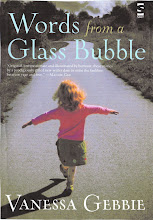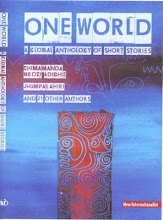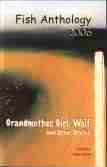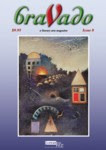I have no answers to this one, just questions...
A writer asked me to give him an endorsement for a forthcoming short story collection a few days ago. (Ballistics by Alex Keegan. Salt Publishing (naturally!) June 2008... look out for this one.)
This is the guy who I credit with teaching me so much... and I was delighted to do so. I hadn't read his work for a while, and asked for a few stories to read, just to refresh...
I read a few pieces, and the floodgates opened. His stuff is terrific; I was instantly back in that place you are as a slightly wobbly learner, awestruck.
And the few lines I wrote (which will probably never be used, who am I anyway?!) included this phrase
"emotionally true, sharply intelligent and often beautiful."
And that got me thinking.
Then today, there's a review of Issue 2, GUD.
In one of the most beautiful stories in this issue, Vanessa Gebbie creates Jamie Hawkins in "Jamie Hawkins' Muse"
and
The story that won at Per Contra (Silver Leaves for Judah Jones...HERE) was described by the editors as 'beautiful'.
But WHY and HOW is work beautiful? What makes Jamie H so? The language is fairly simple and deals with a mortician! Judah is more rhythmic...and he's a window cleaner in love with a window... I dunno!
I know in the work of the writer mentioned above, its a combination of rhythm (he's Welsh, and the rhythms remind me so much of my childhood, and they sing, and flow), and character... the creation of real people who take you by the hand and look closely at you as they tell their stories... and thematic stuff. Themes that touch.
And I am sitting here wondering if you can be taught to write beautiful, and if that is what happened when I was taught, or whether its a hit and miss thing that happens with a combination of craft things almost by accident.
Because if I try to write beautifully, I miss by a few miles.
On the other hand, maybe its not in the writing at all. Maybe its in the air, the thing that happened when the floodgates opened, that made me feel a bit wobbly? Is it a chemistry thing?
I get =the same sense when reading The Shawl by Cynthia Ozyck, or In The Gloaming by Alice Eliott Dark. Both those stories are beautiful.
Wednesday, 2 April 2008
What makes a story 'beautiful'?
Subscribe to:
Post Comments (Atom)




.JPG)























6 comments:
Great post, Vanessa, it got me thinking. I wonder if beauty is in the response it evokes in the reader? As with art or music, is it an emotional fault-line that opens between the words and the reader?
I think a writer can choose to try and "mine" that ground where the line lies, but I don't think that necessarily means he/she will succeed. Conversely, I think a writer can evoke the response unintentionally, simply by writing what is true and real.
I think your stories are beautiful. The Lych-Warmer, for instance, deals with a rather ghastly subject (it made my mother shudder when I tried to describe it), but the mood of the piece, the composition was just pitch-perfect. Tasting Pebbles was another one, although in that it was the lyricism of the writing which drew the emotional response (from me, anyway).
Maybe Keats had it: "Beauty is truth, truth beauty."
Truth is beauty... I like that. But it's like so much with wriitng, you have to look at it out of the corner of your eye because if you look at it full on it slides away.
I understand it somewhere....
and interesting that you pick The LW as an example. That has the same window image. Saying something about the impossibility of love. maybe thats teh 'truth' here.
Or... is it that we read with an automatic fault line gaping between us and the words... and the successful writer successful writing has the effect of CLOSING the faultline?
Interesting! I see the fault-line as a good thing, which is why I'm happy for it to be opened. I suppose I spend a lot of my working life suppressing emotions in order to get on and Do. The act of reading a good book is a way of connecting with those emotions, be they good (joy, love) or bad (anger, fear). I'm happy to have the line opened, and always approach a book with the hope it will make me laugh or cry, be scared or simply entertained. People talk about reading to "escape" but I don't see it that way. I see the reading of a good book as a way of engaging, utterly, unconditionally, with a brutal reality. Does that make me sound like a hopeless masochist?!
yes I see what you're saying. Read something that touches you and there's a welling up of something from deep down somewhere... but also... you can have this sense that the walls have closed, of wholeness, and thats a beautiful feeling. They'll put me away next!
But thats why I saw a successful piece of work as one that stopped the distances opening up, rather defeated them completely. Wrong analogy probably!
I love your analogy. Yes, it's about "wholeness" - putting you back in touch with emotions you have to ration a lot of the time just to get by at work etc. And I totally agree with that you say about "understanding it somewhere", about the truth being a thing that eludes close inspection.
Save me a place in the padded cell won't you?!
Post a Comment